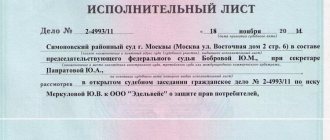How to remove restrictions on traveling abroad: how long does the ban on traveling abroad last?
The content of the article
The responsibilities of residents of the Russian Federation include timely payment of fines, utility bills and other obligatory payments or debt obligations. Since data on bills that were not paid on time becomes available to customs services, citizens with debts will not be able to leave the country.
The basis is a decree restricting travel outside the Russian Federation. Bailiffs have the right to impose it. How long does the ban on traveling abroad last and how is it lifted?
How sanctions are imposed
The procedure for imposing a ban on traveling abroad is as follows:
- the ban on traveling abroad can only be updated when the defaulter is an ordinary Russian or individual entrepreneur;
- the ban on traveling abroad cannot apply to the accountant and the head of the individual entrepreneur (the same applies to close relatives of the debtor individual);
- a ban on traveling abroad presupposes the presence of a non-property executive document.
Restricting the debtor's movement is only one of the possible measures taken against the defaulter. A person can be prohibited from traveling outside the Russian state only if he continues to ignore his duties.
Typically, a Russian is given 5 working days from the date of commencement of enforcement proceedings to repay a debt to the state or financial organization. The bailiff is not obliged to take the initiative to initiate enforcement proceedings, although he has such a right.
When is a travel ban imposed?
The legislation provides grounds for restricting movement outside the Russian Federation for the following categories of citizens:
- Persons working with information that is a state secret or that is considered important. They do not have the right to leave the country for five years or more. The deadline for lifting restrictions on traveling abroad is specified in the work contract.
- Citizens who are called up for military service or are in alternative service will not be able to travel abroad. The restriction is imposed until the completion of the contract.
- If legal proceedings are initiated against persons, they also cannot leave the country.
- Those who have been convicted of a crime or are serving time in a prison cannot travel outside the Russian Federation.
- Persons who do not comply with the imposed administrative penalty also do not have the right to travel outside the country.
- Those who provided incorrect information to the passport office.
- A bankruptcy case may be behind the travel restrictions.
Note!
Military personnel can leave the country only with the permission of the leadership, having in hand the established form of permission.
There are also restrictions for persons under 18 years of age. They have the right to leave the country accompanied by an adult who is:
Provided that a minor citizen is going to travel outside the country without parents or guardians, he must have their consent certified by a notary. Guardianship authorities must receive information about the movement of persons under 18 years of age.
The law also spells out the grounds for issuing a ban in the presence of debts. When control authorities issue a ban, the data will appear in the border guards’ database. Article 67 of the Federal Law “On Enforcement Proceedings” stipulates that a person will not leave the territory of the Russian Federation if:
What are the situations?
Most Russians are not very familiar with the Constitution of the Russian Federation. Faced with a ban on traveling abroad, some people are interested in the possibility of restrictions on their right to move within Russian territory.
Work of bailiffs with debtors
To date, the legislation of enforcement proceedings does not provide for such restrictions. But the bailiff may have information about how the debtor moves. The defaulter must understand that he will not be able to hide from his responsibilities.
Sometimes the bailiff does not have any information regarding the domestic or foreign passport of the defaulter. It is important to understand that a person will not be allowed to go abroad if the bailiff only knows his first and last name and date of birth.
People often turn to lawyers asking whether they will be released abroad if they pay off the debt when going through passport control. It is possible to pay off your debt at the border. But the ban on traveling abroad will continue to apply.
The decision to lift travel restrictions is not made by border officials. They only receive information upon completion of enforcement proceedings. Border guards receive up-to-date information from the FSB database.
Some defaulters are interested in the question of whether it is possible to circumvent the law and travel abroad through some other Russian city. There is no such possibility. In 2008, Russians with debt to the state or financial organization had the opportunity to travel abroad through Belarus. According to some reports, in 2021, defaulters will no longer have such an opportunity.
Sometimes Russians whose activities involve visiting foreign countries turn out to be debtors to the state or financial organization. It is important to consider that the ban may apply even to sailors and missionaries. This is explained by the fact that usually the bailiff does not have information regarding the type of activity of the defaulter.
We invite you to read: To collect alimony for three years: a sample claim for the collection of alimony
Some Russians face sanctions when applying for a foreign passport. If there is a debt, but there are no restrictions on travel, the Russian must appeal the refusal of the employees of the Main Directorate for Migration Affairs of the Ministry of Internal Affairs to a higher authority.
Theoretically, restrictions on visiting abroad are possible even if there are periodic payments. This is explained by the fact that enforcement proceedings are being carried out at the Russian’s address. But such a limitation is easily disputed. Sometimes the issue is resolved before going to court.
How to lift a ban on traveling abroad
According to current legislation, citizens who are prohibited from leaving the country are sent a written notification. The message must indicate the reason for the ban and its duration. If during this period a non-traveling citizen issues a foreign passport, it will be kept in the passport office until the ban ends.
Note!
As soon as information about the debt is transmitted to the border guards, it appears at all checkpoints. The person will not be able to travel outside the country.
Despite the fact that the duty of bailiffs is to notify citizens that a travel ban has been adopted against them, Russians can also find out about the presence of a prohibiting document on their own. This service is available on the website of the bailiff service.
This is important to know: Petition to terminate proceedings in a civil case: sample
Similar information is available on other sites:
- on the government services portal. About tax arrears and unpaid fines, outstanding amounts under court decisions;
- on the tax service website. Information about debts, but to access them you need an identification code;
- The Central Bank website contains data on debts to banks.
Note!
For non-payment of utility bills, citizens will pay fines in the amount of 17.7 percent of the amount each year.
After the debtor has received notice of the travel ban, he can repay the debt voluntarily within 14 days. Time is counted from the day the resolution is adopted, and not from the moment the document is received, so you need to act quickly. After this period has expired, the information will be sent to the border service.
How to lift a travel ban? You should know that travel restrictions are not lifted immediately after payment, but within ten days from the moment the amount is transferred.
Note!
This period can be reduced if the citizen presents a medical opinion stating that it is necessary to fly outside the country due to medical reasons.
Bailiffs have the power to cancel a decision on a travel ban. They do this only after receiving documents confirming the payment of amounts and repayment of all debts. The procedure consists of the following steps:
Provided that the ban was imposed due to debt on utility bills, one payment receipt is not enough to lift it. This can only be done by an authorized body.
There are cases when it is possible to challenge the imposition of a ban. This procedure is provided for by law, provided that errors were made when drawing up the resolution. For example, a decree was issued within the same time frame when the debtor paid the debt. You can also challenge a decision if a person was not notified about it.
Where can I check the restrictions on traveling abroad and how can I receive a special notification?
Today, the fact of restrictions on traveling abroad for a specific person can be checked even on the Internet. Information of interest can be easily found on the following resources:
- on the FSSP website, where all information on debtors, enforcement proceedings, seized property and imposed restrictions is concentrated;
- on the single portal of State Services (there you can always see if there are unpaid fines, if there are debts, and therefore restrictions);
- on the website of the Federal Tax Service.
Regardless of the reasons why travel abroad is limited, local FMS authorities provide information to interested parties in special notifications, which indicate:
- duration of the ban;
- grounds;
- number and date of the decision in the case;
- name and address of the institution/organization prohibiting departure.
If prohibiting circumstances arose after the exit documents were processed, then border crossing control is carried out either:
- employer;
- FSSP;
- Ministry of Internal Affairs and/or Federal Penitentiary Service.
It is they who must rush in and promptly notify the FMS that circumstances have arisen that do not allow a particular citizen to travel outside of Russia. And those who do not agree with such a decision can appeal it in court or write a complaint to the FMS. The first, naturally, will be more effective, especially if a person is confident that he is right and that the imposition of a restriction is unfair. At the same time, you can file a claim in court for compensation for actual unnecessary expenses and moral damage.
How long does the ban on traveling abroad for debt last?
In addition, it should be remembered that the decree restricting travel abroad has its validity period. This means that upon its expiration the ban will also be lifted. How long is the ban on traveling abroad valid? The duration of the ban depends on who issued it:
- Bailiff - 6 months with the possibility of extension.
In this case, the decree banning leaving the territory of the Russian Federation is valid for no more than six months - exactly 6 months after the decree is issued, the ban is automatically lifted. According to Appendix No. 54 of the Order of the Federal Bailiff Service of Russia dated July 11, 2012 N 318, if the debtor has not fulfilled its debt obligations within this period, the bailiff may impose a ban again. Thus, the debtor will actually remain restricted from traveling until he repays the debt.
- Judge - according to the circumstances of the case, but not more than the period stated by the claimant.
When the case is closed
Russians who have debt are interested in the question of when they will be released abroad again and when the writ of execution will cease to be in force.
Enforcement proceedings are terminated in two ways: by a court decision and on the initiative of an FSSP employee.
In the first case, this happens in the case:
- death of the defaulter;
- death of the claimant;
- lack of opportunity to perform one or another action prescribed by the writ of execution;
- claimant's refusal.
There are other cases provided for by Russian legislation. It is noteworthy that the case is terminated in the event of the death of one or another participant in the process only when we are talking about individuals.

The bailiff may also take the initiative to cancel the enforcement proceedings. This can happen if a judicial act is adopted. Another reason is the court’s agreement with the claimant’s refusal. But most often, enforcement proceedings are terminated against the backdrop of a settlement agreement between the participants in the process.
How to check if there is a ban on traveling abroad? What can you do to avoid being left behind? The answers to these and other questions are in the next video.
Sometimes the court cancels the issued act. Against this background, the bailiff also decides to abandon enforcement proceedings. Proceedings are also terminated when the writ of execution is declared invalid.
After the case is closed, papers do not immediately enter the database.
Therefore, it is strongly recommended to check all debts in the registry before traveling abroad again. You can do this on the service nevylet.rf.
From October 1, the ban on debtors traveling abroad can be lifted in one day
The amendments affected the minimum amount of debt at which such a ban can be issued. Now travel may be prohibited to citizens who owe:
In addition, your exit will be closed only after:
- the creditor (bank, management company, tax service, etc.) settled the debt, i.e. on the basis of a court decision, received a writ of execution or a court order;
- the debt was submitted for collection to the bailiff service and was not paid voluntarily within 5 working days.
There are exceptions: 1 If you owe on loans, borrowings and other debts, with the exception of alimony, from 10 to 30 thousand rubles, the bailiff has the right to prohibit traveling abroad 2 months after the expiration of the voluntary payment period. Those.
With what debt will they not be allowed to leave the country in 2021?
Is it possible to get a foreign passport if you have debts from bailiffs? Yes, but only if you are not subject to a travel ban. What are the reasons for lifting restrictions? — The debtor complied with the requirements for enforcement proceedings; — The court canceled the writ of execution or judicial act on which the individual entrepreneur was opened; — The writ of execution was returned to the claimant; — The debtor and the claimant came to a peaceful agreement; — The court granted the defaulter an installment plan or deferment, etc.
How long does the temporary FSSP restriction on travel last? 6 months. If the debt is not paid within this period, the ban will be extended.
How is the period for lifting restrictions calculated? The period consists of the time required for: 1. Transferring funds to the FSSP; 2. Closing enforcement proceedings; 3. Redirection of information about lifting the ban to the Border Guard Service; 4.
Just choose
Citizens restricted from traveling have found an excellent way to leave their homeland, despite all prohibitions, through friendly border states, upon entry into which there is no border control as such. For travel around the planet, transit points can be Belarus, Kazakhstan, Lithuania and Ukraine.
Today, in view of current events, using Ukraine for traveling abroad is very risky. How does everything happen? Simple enough. A citizen who does not have the right to cross the border freely enters a friendly country, and from there, where there are no Russian border guards, calmly travels to other states.
The method is risky, because passport and border controls when entering these countries also sometimes occur. Before my eyes, I was denied entry to Abkhazia due to debts - also a seemingly friendly country that does not border on European states.
- Bank loan.
- MFO loan.
- To the state on traffic police fines.
- Management companies for utilities.
- Former spouse and child for alimony.
- To the state for taxes.
Any of the above categories of debtors does not automatically become prohibited from traveling even if the amount of his debt exceeds 30 thousand rubles. Temporary restrictions on traveling abroad do not always arise even after a court decision is made.
There are nuances here too. For example, debts arising from traffic fines do not concern the courts in any way; they are immediately transferred to the FSSP. But in most cases the process goes like this.
How long does the ban on traveling abroad for debt last?
Restriction on travel abroad for debtors Traveling abroad with debts, or rather failure to leave, is regulated by several laws, including the federal laws “On the procedure for leaving the Russian Federation and entering the Russian Federation” and “On enforcement proceedings.” They are written in dry language and sometimes it is more difficult to understand them than the language of aliens who flew from the constellation Alpha Centauri. Therefore, I will explain everything in simple terms. Temporary restriction of the right to travel outside Russia is considered an effective measure and the Federal Bailiff Service (FSPP) successfully applies it, but many do not know exactly how such a process is launched. The very fact of debt, be it a loan, traffic police fines or alimony, does not automatically make a person unable to travel abroad. Where and how to check the availability of credit debt Loan debts will also prevent you from traveling to another state. To find out about the debt, you need to contact each banking institution with which the agreement was concluded and clarify information about the debts. To do this, you can either visit a bank branch yourself, go to your personal account or call the credit institution’s hotline. When visiting in person, you must have your passport with you. To obtain information over the phone, you will have to answer several clarifying questions asked by the operator.
How to lift a ban on traveling abroad The simplest and most correct way to lift the ban is to pay off the existing debt. Moreover, this must be done in advance, and not a few days before leaving Russia.
To lift the travel ban, you need to pay off your debts. It is important to pay off your debts in advance.
How to travel abroad through the countries of the Customs Union
Not every debt can be grounds for issuing a travel ban. Many people are interested in the question of whether it is possible to travel abroad with debts. Let's look at what debts restrict leaving Russia.
First of all, you need to know that debtors whose amount of debt exceeds 30 thousand rubles are subject to the ban. At the same time, it is important to remember that only those amounts for which there is a court decision and enforcement proceedings have been initiated are taken into account.
Due to what debts they may not be allowed to leave Russia:
- debt obligations arising from contracts (lease, provision of services, contracts), including credit, as well as to private individuals (based on receipts);
- unfulfilled administrative penalties in the form of fines (for example, for violating traffic rules);
- tax arrears;
- unfulfilled alimony obligations;
- unpaid utility bills;
The presence of a travel ban does not eliminate the need for urgent departure from the country, since the reasons for departure may be urgent and justified. The question arises of how to travel abroad if there is a ban. There are various ways to leave Russia abroad with debts.
The most technically simple and reliable option for solving the problem that has arisen is to pay off the debt. Thus, there is an absolutely legal solution to this problem. But what if a person does not agree with the amount of the debt or the procedure for its payment, but due to the lack of notification of court proceedings and a decision, he could not report this in a timely manner.
We invite you to read: Failure to comply with a court order - advice from lawyers and lawyers
Let's look at other legal ways to leave Russia with debts. So, another solution option is to travel through the countries of the customs union. But how to leave Russia with debts through the countries of the customs union? This is possible, although it entails certain risks on the part of the debtor.
The effectiveness of this method lies in the existence of agreements on a simplified procedure for crossing the border between Russia and the countries of the Customs Union. When asked whether it is possible to travel with debts through the countries of the customs union, we answer that it is possible. It is important to know the features and procedure for crossing the border with the countries of the union, since such a rule does not apply everywhere.
For a long time, the favorite way for debtors to leave the country without hindrance was through Belarus, since the border between our countries was practically arbitrary.
Despite the Agreement between the Governments of the two countries in force since 2015 on the exchange of data on citizens with a travel ban. For a long time, the presence of this document did not prevent people from traveling to third countries from the territory of Belarus. Any type of transport was allowed: car, bus, train, plane.
So is it possible to travel to Belarus with debts from the bailiffs? Since 2017, border crossing rules have become stricter, but most people are able to leave without any problems.
Russian citizens with a travel ban can freely leave the country through Lithuania.
1. Buy a train ticket to Kaliningrad. By purchasing a ticket to Kaliningrad, a person does not violate the ban on leaving the country, since Kaliningrad is Russia.
2. Along the route, you must get off at a station in Lithuania. From there, fly to your final destination country.
To travel through Kazakhstan, you need to buy 2 tickets: through and to Petropavlovsk. When crossing the border, you need to use a transit ticket; accordingly, for border guards, the citizen is listed as a transit passenger. In Kazakhstan, use the second ticket and fill out a migration card. Upon arrival in Petropavlovsk, freely go to the desired destination.
Using any of the above methods to overcome the travel ban in itself is not a significant violation of the law, since gaps in the current legislation give the right to such actions.
This is also due to the lack of a unified database between neighboring states. The border services of Belarus, Lithuania or Kazakhstan do not aim to persecute citizens who have a ban on leaving the Russian Federation.
Often citizens decide to change their last name in order to leave Russia with debts. To figure out whether it is possible to go abroad if your last name has changed, let’s turn to the legislation. According to the Civil Code of the Russian Federation, a change of surname does not exempt a citizen from fulfilling his obligations to the state or to third parties.

Accordingly, when leaving Russia, border guards check both the changed data of the person and the data that has been changed. Even if the bailiff did not make the appropriate changes to the travel ban order, the database will display them by the last name that was before the last name change. Using this method to circumvent the ban will not give positive results.
A popular service now is the use of travel agencies for “Not Traveling”. Such organizations offer their services for organizing safe departure from Russia if there is a ban on leaving the country and answer the question of how to fly abroad with debts.
How long does the ban on traveling abroad for debts in Russia last?
We are going abroad with debts: prohibitions, debts and restrictions are not a hindrance! Bailiffs implement the court decision by sending the restriction order to the border and migration services. Who and how establishes a travel ban To ban a Russian from traveling abroad, the bailiff must have a court decision that has entered into force. Having this document in hand, the bailiff opens enforcement proceedings. If the debtor is within reach, he is given 5 days to pay the debt. Then the bailiff, at his own discretion or at the request of the creditor, decides to restrict travel and sends the necessary documents to the border and migration services. After a sanction is imposed, the citizen will not be allowed to travel abroad; their passport may be confiscated or its issuance may be refused. The seizure takes place at the border, then the passport is sent to the issuing agency.
Answers to frequently asked questions
1. How to quickly lift the travel ban after paying the debt?
It is important to know that the mere fact of paying the debt, even at the airport, will not ensure immediate exclusion from the database. To speed up the process, you must contact the bailiff with evidence of debt repayment and obtain a properly executed order to lift the restrictions (a signature and seal are required). And also clarify the time of sending the document to the Border Guard Service of the Russian Federation. After receiving this document, the ban will be lifted.
2. Is it possible to travel abroad with installments?
The installment plan gives the right to unhindered exit from the territory of the country only if it is issued through the judicial authorities. To do this, you need to contact the bailiff and prepare a petition to the court that made the decision in the case. Based on the court decision on installment payment, the debtor is excluded from the list of citizens who are prohibited from leaving the country. An important condition for the effectiveness of the method is compliance with the debt repayment schedule.
3. Which countries can you travel to with debts?
The easiest way is through Belarus, but you can still travel to almost any country if you build your route through Lithuania or Kazakhstan.










